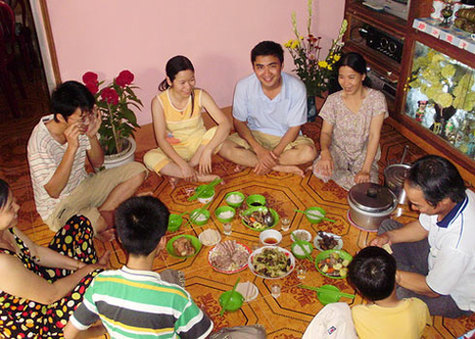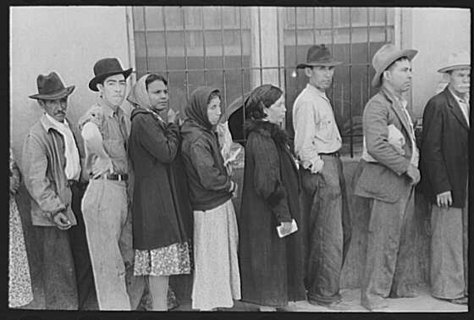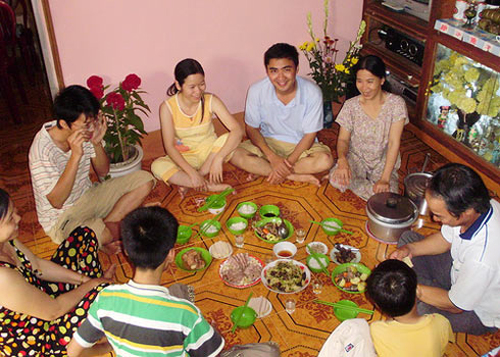Oh the mind-bending hopelessness of the family mealtime!!!

This last week I read a story on Slate that attempted to relate the findings and conclusions of a study by 3 North Carolina State University Sociologists: Sarah Bowen, Sinika Elliott and Joslyn Brenton. Their team conducted in-depth interviews with 150 black, white, and Latina mothers from all walks of life. They observed 250+ hours with 12 working-class and poor families in their homes as they prepared and ate meals, and tagged along on trips to the grocery store.
Their conclusions were. . . . interesting.
All that preparing and working to lovingly craft a healthy meal for one’s family? Yeah, they’re against it.

“In the fight to combat rising obesity rates, modern-day food gurus advocate a return to the kitchen. The message that good parents—and in particular, good mothers—cook for their families dovetails with increasingly intensive and unrealistic standards of “good” mothering.
So, define these “unrealistic standards of ‘good’ mothering.” What exactly is the minimum standard we should all shoot for?

In general, I am a pretty amiable person. I am willing to look at multiple angles of a situation/issue in order to reach common and ground with those whom I may have a difference of opinion. Reading through this study, I certainly felt a bond with, and compassion toward, all of the women they observed. But rather than celebrate the sacrifice of and offer encouragement to these and other women (or men for that matter,) the researchers go full bonehead. Yes, I said bonehead.
The authors of the study point out that the “nostalgia” foodies have for home cooked meals is a fallacy, “They fail to see all of the invisible labor that goes into planning, making, and coordinating family meals. Cooking is at times joyful, but it is also filled with time pressures, tradeoffs designed to save money, and the burden of pleasing others.”
Are you kidding me? Yes, making dinner is hard, caring and providing for a family is hard. No one ever said it was easy. I certainly don’t need these women floating in and stamping the word “victim” on my forehead. If you as a parent aren’t willing (I didn’t say unable) to feed your family then whose responsibility is it?
Fortunately, these non-domestic divas are going to bring us the solutions. Buckle up!

“So let’s move this conversation out of the kitchen, and brainstorm more creative solutions for sharing the work of feeding families. How about a revival of monthly town suppers, or healthy food trucks? Or perhaps we should rethink how we do meals in schools and workplaces, making lunch an opportunity for savoring and sharing food. Could schools offer to-go meals that families could easily heat up on busy weeknights? Without creative solutions like these, suggesting that we return to the kitchen en masse will do little more than increase the burden so many women already bear.”
Let’s point out the stupidity of this conclusion:
1. Feeding families should be a shared burden by all. Schools and town municipalities should be responsible for helping busy families eat.
I am a huge advocate of the Food Bank and will always donate to this cause. I do not want to ever see any child go hungry, but there is a difference between a true need and when something is just difficult (if only slightly.) The researchers’ “solution” that to-go meals for busy families should be provided by their children’s schools is ridiculous. Because schools, having achieved every other single goal in educating our children, should now serve take out. Do these researchers educate their children in the back room of a Kentucky Fried Chicken? Why should we move the responsibility for feeding one’s family away from that family and assign that responsibility to the public education sector? In what universe does that make any sense at all?
The traditional mealtime, that we have enjoyed throughout recorded civilization, loosely resembling this:

would now look more like this:

And we would call it “progress?”
 2. How about a revival of monthly town suppers?
2. How about a revival of monthly town suppers?
I get the feeling that the researchers have attended precious few of these events, exemplified by the American traditional Church Picnic. You see, these types of meals are a LOT of work for many people. Somebody is cooking and preparing the food. It doesn’t fall as if manna from Heaven. People spend a lot of time preparing the seating and eating area and will stay to clean up after it is done. I would suspect that the researches make up that that subset of attendees that breeze in late with their ratty bag of chips purchased from the clearance aisle of the gas station ten minutes prior and proceed to load up on the deviled eggs before anyone else has a chance. (Seriously people, take one, or at most two, then move along. People more polite than yourself are fantasizing about breaking your hand when you reach for your third.) They then blow out with their arms stuffed with portable goodies before the cleanup is to begin.
The thing is, that this is just one meal, and it is a lot of work for those that aren’t freeloading. You aren’t saving any effort, you are just transferring the extra effort to others. It really isn’t a sustainable solution.
3. Perhaps we should rethink how we do meals .. in workplaces, making lunch an opportunity for savoring and sharing food?
Brilliant plan, my employer is now responsible for not only my salary, my health insurance, and collecting taxes for the government, they should be directly feeding all of my family members. And apparently the actual food wouldn’t be enough, the experience must be memorable and relaxing. Top notch solution ladies. I’ll schedule the violinist and medi pedies and bill it to the boss. For those of us that are self employed? I guess we all are back to the Hell of home prepared meals. . .
4. This study completely leaves out the fact that not all women are the ones who cook for the family.
Quite often men DO cook and do it well and contribute and share in the work of feeding family members. Children can also be enlisted to help contribute to the making of meals, but perhaps that would be considered to be”unrealistic standards of “good” mothering?”
Now How About Some Real Statistics?
According to a study (Do Family Meals Really Matter) by the Cornell University Department of Policy Analysis and Management researchers found:
- By engaging in family meals your child be 35% less likely to have an eating disorder
- Your child will also be 24% more likely to eat healthier foods and 12% less likely to be obese.
Or how about these statistics from a study published in The Journal of Adolescent Health based on a nationally representative sample of 26,069 Canadian adolescents ages 11 to 15 in 2010. Please note the much larger sample size of this study versus the one we are discussing with just 250 families .
With each additional dinner, researchers found fewer emotional and behavioral problems, greater emotional well-being, more trusting and helpful behaviors toward others and higher life satisfaction, regardless of gender, age or family economics.
Bringing In The Real World
I have discussed before here on JENerally Informed that mealtimes aren’t always perfect and they don’t have to be. Some of the best meals are made with simple ingredients and simply made. Last night I fed my family dinner at a cost of $1.50, was it something I would take pictures of, no, but it filled all of our stomachs. It also afforded us an opportunity to talk about our day and brought us together for a short period of time. This doesn’t happen every night, but it happens as as often as we can make it and is a time we all look forward to.

To the researchers I would like to close with the thought that perhaps if you had spent those 250 observation hours actually helping the families you spent time with instead of documenting their “struggle” then you might have been actually able to count the world better for your effort instead of gracing us with your garbage “study.”
Kudos to all of the Mother’s and Father’s out there every day who struggle to care for their family. It isn’t easy, but nothing that’s worth it ever is.
Stay Happy! Stay Informed!
Love,




